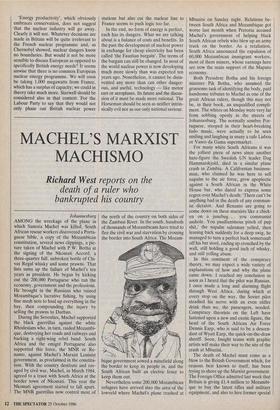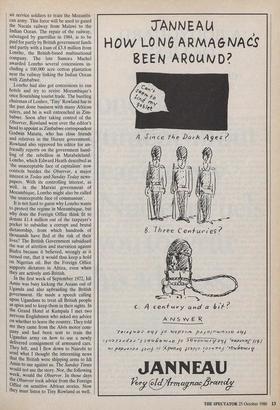MACHEL'S MARXIST MACHISMO
death of a ruler who bankrupted his country
Johannesburg AMONG the wreckage of the plane in which Samora Machel was killed, South African rescue workers discovered a Portu- guese bible, a copy of the Mozambican constitution, several news clippings, a pic- ture taken of Machel with P.W. Botha at the signing of the Nkomati Accord, a three-quarter full, unbroken bottle of Chi- vas Regal whisky and some prawns. That lists sums up the failure of Machel's ten years as president. He began by kicking out the 200,000 Portuguese who ran the economy, government and the professions. He brought in the Russians who ruined Mozambique's lucrative fishing, by using fine mesh nets to haul up everything in the bay, then compounding the injury by selling the prawns to Durban.
During the Seventies, Machel supported the black guerrillas against the white Rhodesians who, in turn, raided Mozambi- que, destroying her roads and railways and backing a right-wing rebel band. South Africa • and the emigrd Portuguese also supported this force, the MNR or Re- namo, against Machel's Marxist Leninist government, as proclaimed in the constitu- tion. With the country destitute and rav- aged by civil war, Machel, in March 1984, agreed to a truce with South Africa at the border town of Nkomati. This year the Nkomati agreement staked to fall apart. The MNR guerrillas now control most of the north of the country on both sides of the Zambesi River. In the south, hundreds of thousands of Mozambicans have tried to flee the civil war and starvation by crossing the border into South Africa. The Mozam- bique government sowed a minefield along the border to keep its people in, and the South African built an electric fence to keep them out.
Nevertheless some 200,000 Mozambican refugees have arrived into the area of the lowveld where Machel's plane crashed at Mbuzini on Sunday night. Relations be- tween South Africa and Mozambique got worse last month when Pretoria accused Machel's government of helping black South African rebels who blew up an army truck on the border. As a retaliation, South Africa announced the expulsion of 60,000 Mozambican immigrant workers, most of them miners, whose earnings here are now the main support of the Maputo economy.
Both President Botha and his foreign minister Pik Botha, who assumed the gruesome task of identifying the body, paid handsome tributes to Machel as one of the great African riders, though this may not be, in their book, an unqualified compli- ment. The whites on Monday were very far from sobbing openly in the streets of Johannesburg. The normally sombre Por- tuguese, steeped in their heart-breaking fado music, were actually to be seen smiling and laughing in many a cafe Lisboa or Vasco da Gama supermarket.
For many white South Africans it was the jolliest piece of news since another hate-figure the Swedish UN leader Dag Hammarskjold, died in a similar plane crash in Zambia. A Californian business- man, who claimed he was here to sell napalm to the air force, grew apoplectic against a South African in the White House bar, who dared to express some regret over Machel's death: 'There can't be anything bad in the death of any commun- ist dictator. And Renamo are going to come down on these mandsts like a chick- en on a junebug. . . you communist asshole. You pusillanimous pinch of pup shit,' the napalm salesman yelled, then leaning back suddenly for a deep swig, he managed to turn a perfect back somersault off his bar stool, ending up crouched by the wall, still holding a good inch of whisky, and still yelling abuse.
In this continent of the conspiracy theory, we may expect a wide variety of explanations of how and why the plane came down. I reached my conclusion as soon as I heard that the pilot was Russian. I once made a long and alarming flight through West Africa, during which at every stop on the way, the Soviet pilot steadied his nerve with an even stiffer drink than we, the passengers, needed. Conspiracy theorists on the Left have fastened upon a new and exotic figure, the head of the South African Air Force Dennis Earp, who is said to be a descen- dant of Wyatt Earp, the quick-on-the-draw sheriff. Soon, Insight teams with graphic artists will make their way to the site of the crash at Mbuzini.
The death of Machel must come as a blow to the British Government which, for reasons best known to itself, has been trying to shore up the Marxist government. The Foreign Office admitted last week that Britain is giving £1.4 million to Mozambi- que to buy the latest rifles and military equipment, and also to hire former special air service soldiers to train the Mozambi- can army. This force will be used to guard the Nacala railway from Malawi to the Indian Ocean. The repair of the railway, sabotaged by guerrillas in 1984, is to be paid for partly by British government funds and partly with a loan of f_3.8 million from Lonrho, the British-based multinational company. The late Samora Machel awarded Lonrho several concessions in- cluding a 100,000 acre cotton plantation near the railway linking the Indian Ocean with Zimbabwe.
Lonrho had also got concessions to run hotels and try to revive Mozambique's once flourishing tourist trade. The bustling chairman of Lonhro, 'Tiny' Rowland has in the past done business with many African rulers, and he is well entrenched in Zim- babwe. Soon after taking control of the Observer, Rowland went over the editor's head to appoint as Zimbabwe correspondent Godwin Matatu, who has close friends and relatives in the Harare government.
Rowland also reproved his editor for un- friendly reports on the government hand- ling of the rebellion in Matabeleland.
Lonrho, which Edward Heath described as 'the unacceptable face of capitalism' now controls besides the Observer, a major
interest in Today and Sunday Today news- papers. With its controlling interest, as
well, in the Marxist government of Mozambique, Lonrho might also be called 'the unacceptable face of communism'.
It is not hard to guess why Lonrho wants to protect the regime in Mozambique, but why does the Foreign Office think fit to donate £1.4 million out of the taxpayer's pocket to subsidise a corrupt and brutal dictatorship, from which hundreds of thousands have fled at the risk of their lives? The British Government subsidised the war of attrition and starvation against Biafra because it believed, wrongly as it turned out, that it would thus keep a hold on Nigerian oil. But the Foreign Office supports dictators in Africa, even when they are actively anti-British.
In the first week of September 1972, Idi Amin was busy kicking the Asians out of Uganda and also upbraiding the British government. He made a speech calling Upon Ugandans to treat all British people as spies and to keep them in their sights. In the Grand Hotel at Kampala I met two nervous Englishmen who asked my advice on whether to leave the country. They told me they came from the Alvis motor com- pany and had been sent to train the Ugandan army on how to use a newly delivered consignment of armoured cars. They left, and I flew down to Nairobi to send what I thought the interesting news that the British were shipping arms to Idi Amin to use against us. The Sunday Times would not use the story. Nor, the following week, would the Observer, In those days the Observer took advice from the Foreign Office on sensitive African stories. Now they must listen to Tiny Rowland as well.



























































 Previous page
Previous page